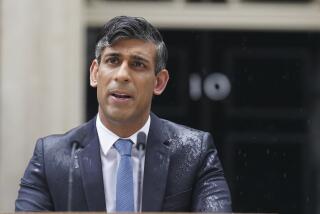Thatcher Expected to Call Election Soon : Confident Prime Minister Buoyed by Showing in Local Balloting
- Share via
LONDON — In the wake of her Conservative Party’s strong showing in local government elections, Prime Minister Margaret Thatcher on Friday was widely expected to announce a general election within the next few days.
Against a backdrop of mounting speculation, Thatcher departed Friday evening for the prime minister’s country residence at Chequers, northwest of London, to confer this weekend with political advisers about the results of Thursday’s balloting, which has been considered the final test of Conservative Party strength before the next general election.
Political commentators here expect Thatcher to formally end months of anticipation Monday and announce an election date for next month, probably June 11.
British general election campaigns are usually short, spanning little more than the minimum three weeks between the formal announcement and polling day.
Since the Conservatives have established a consistent lead in opinion polls of about 10 percentage points over the main opposition Labor Party in recent months, it was believed that only a major collapse of Tory support in the local elections would deter Thatcher from launching an immediate quest for an unprecedented third term as prime minister.
Term Expires in June, 1988
In theory, she is not required to call an election before June, 1988, when her present five-year term expires. But with her present standing strong, economic indicators positive and her principal opponents fighting among themselves, her chances of winning are judged extremely good.
Adding to the atmosphere of government confidence, the Bank of England on Friday announced a one-half-percent cut in interest rates, and the London stock market index surged to a record high.
If the 61-year-old prime minister does decide to call on Monday for the election, she would first inform her Cabinet of the decision, then travel the half a mile to Buckingham Palace to notify Queen Elizabeth II before making any public announcement.
Several of Thatcher’s senior ministers have reportedly urged her to call the election in part to end public uncertainty over the timing, contending that the speculation has been so intense that it has colored much of the government’s business in recent weeks.
It has also generated a sense of enthusiasm and anticipation among her own party’s rank-and-file workers that would be difficult to rekindle later, political observers noted.
Similar to 1983 Events
At least some of this anticipation stems from the similarity of present events to those in the spring of 1983, when, following successful local elections in May, Thatcher emerged from a weekend conference with aides and announced the June 9 general election, which she won by a landslide.
As final returns continued to trickle in Friday, it was evident that Thatcher’s party had done better than expected--marginally increasing its share of the 12,000 local government seats up for election, while the Labor Party lost nearly 200 seats.
“If we had a similarly successful campaign as we fought in 1983, we’d have a fairly substantial majority (in Parliament),” Tory Party Chairman Norman Tebbit said.
A British Broadcasting Corp. analysis of voting in 24 of the country’s 650 parliamentary constituencies projected that the same preferences made in a general election would give Thatcher a majority of 30 seats.
137-Seat Cushion
Because the Labor Party traditionally polls more votes in local than in general elections, political analysts predicted that Thursday’s election would translate into a majority closer to 50 seats--still a sharp drop from the Thatcher government’s current 137-seat cushion.
Although Labor lost ground in key industrial areas of the Midlands where it must win several marginal parliamentary seats to mount any serious challenge to Thatcher in a general election, Labor leader Neil Kinnock remained optimistic about his party’s chances.
“Even on the basis of yesterday’s results, the best possibility for the Conservatives is a majority of 12 to 15 (parliamentary seats)--and that means very obviously that the election is wide open for us to win,” Kinnock said.
As expected, the so-called “third force” in British politics in recent years, the alliance of the smaller Liberals and Social Democrats, sharply increased its number of local offices at the expense of both Labor and the Tories. Still, it remains behind both the Conservatives and Labor as a national force.
Based on Thursday’s results, it seems likely that the two alliance parties can only hope to hold the balance of power if the Conservatives fail to win an overall parliamentary majority.
Labor’s Prospects Dimming
With Labor’s weak showing, Liberal leader David Steel admitted that such prospects are diminishing.
“If, in fact, the Labor Party continues to collapse, it makes that task all the more difficult for us,” he said.
About 10 million voted in Thursday’s elections, roughly one-third the number who cast ballots in Britain’s 1983 general election. Local governmental bodies in Scotland and London were not involved in the voting.
More to Read
Sign up for Essential California
The most important California stories and recommendations in your inbox every morning.
You may occasionally receive promotional content from the Los Angeles Times.













